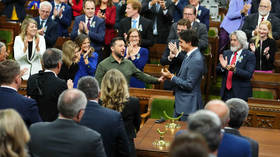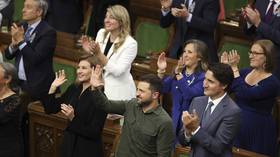Canada saluting a Ukrainian Nazi was no accident

The stomach-churning scene of the Canadian parliament giving a standing ovation three days ago to a former Waffen SS Nazi has by now made the rounds on the internet.
During Ukrainian President Vladimir Zelensky's visit to Canada, and following his predictably bombastic pan-handling speech, House Speaker Anthony Rota went on to gush praise over a Ukrainian-Canadian in parliament that day: Yaroslav Hunka, a World War II-era Nazi, calling him “a Ukrainian hero, a Canadian hero” and thanking him for his service.
Two days later, Rota issued an apology for lauding the man, saying he had “recognized an individual in the gallery” and had subsequently become aware of “more information which causes me to regret my decision to do so.”
Just to be clear – since Rota was not – the individual he meekly referred to was Yaroslav Hunka, and the information which made Rota remorseful was that Hunka had been a voluntary member of 1st Galician Division of the Waffen SS – you know, the one accused of mass murdering Poles, Jews and Ukrainians in Ukraine and Poland, as well as committing other atrocities.
Whereas Rota claims he was unaware of Hunka's service as a Nazi, given that he had also praised Hunka for fighting “for Ukrainian independence against the Russians,” one can assume this is the service he referred to.
In his apology, Rota stated, “no one, including fellow parliamentarians and the Ukraine delegation, was aware of my intention or of my remarks before I delivered them.” Canadian Prime Minister Justin Trudeau's office denied any knowledge of Hunka and his Nazi service, stating, “The Speaker had his own allotment of guest seating at Friday's address, which were determined by the Speaker and his office alone.” It seems highly unlikely, however, that the Canadian government would allow anyone into parliament without thorough pre-emptive screening when Zelensky, a visiting president, was speaking.
Whether Trudeau (and his Stepan Bandera-sympathizing deputy PM Chrystia Freeland) knew about Yaroslav Hunka or not, the question remains: why was he never brought to justice? He, or any of the other 2,000 SS Nazis Canada reportedly took in in the years following WW2. Having been accepted as anti-communist refugees with little to no scrutiny, these suspected war criminals and collaborators have been allowed to live out the rest of their days in peace, and most of them have done so openly under their own names, as the Simon Wiesenthal Center has repeatedly reported.
There is much to be said about Canada's history with Ukrainian Nazis. Not only did it take them in after WW2, but the government-backed Ukrainian Canadian Congress, which, until recently, listed Nazi-collaborator veterans organizations as members, as well as government-funded Ukrainian ‘youth centers’ that celebrate Nazi collaborators like Stepan Bandera and Roman Shukhevich. There are even monuments honoring Nazi collaborators and Ukrainian Insurgent Army criminals still standing in Canadian cities.
Canada has also supported modern-day Nazis in Ukraine itself, by training members of the neo-Nazi Azov Battalion on Canadian soil, although Canadian corporate media has in recent years attempted to downplay this.
Radio Canada reported in April 2022 that the Canadian Armed Forces, “did contribute to the training of soldiers of the Azov regiment in 2020, to the point where this unit is now boasting of being able to train its own soldiers according to Western standards.” The Ottawa Citizen, writing about this report, cited a 2017 briefing by Canada’s Joint Task Force Ukraine as saying, “Multiple members of Azov have described themselves as Nazis.”
In November 2021, the same Ottawa Citizen journalist wrote about Canadian officials meeting with leaders from the Azov Battalion in June 2018. Canadian officers and diplomats, “did not object to the meeting and instead allowed themselves to be photographed with battalion officials despite previous warnings that the unit saw itself as pro-Nazi.”
Canada (together with the US and Ukraine itself) has repeatedly refused to support UN resolutions against the glorification of Nazism, neo-Nazism and racial discrimination, as they were seen as targeting Kiev. An overwhelming majority of member states has supported these resolutions, with Kiev’s other Western backers (like all the EU member states) and their allies (like Japan and New Zealand) abstaining.
If you've followed Canada's unrepentant support to Nazis, the parliament’s standing ovation for a former SS member becomes less surprising. It set off a small storm, with outrage expressed not only by Jewish rights activists and Moscow, but also by the Polish ambassador in Canada.
One can only hope that there were members of parliament who were sincerely appalled to learn they'd cheered for a Nazi. However, now that the apologies have been made, the outrage will most likely simply die down and Ottawa will continue supporting the same kind of people, as long as they are on the same side in the West’s proxy war against Russia.
After all, as Canadian researcher Tamara Lorincz noted, while everyone applauded the Ukrainian Nazi, “Not one MP called for peace, ceasefire & negotiations.” That’s the quiet part few are willing to say out loud – just as Canada apparently accepted SS “refugees” because they were fighters against the Soviet Union’s communism, just as Canada (and other Western powers) are willing to support terrorists if they are fighting against an “undesirable” government in the Middle East, so will Canada continue to cover for, give support to, and pretend to not notice a resurgence of one of history’s most atrocious ideologies as long as its adherents can be used against the current adversary – Russia.
For his part, Zelensky praised Canada for always being on the "bright side of history.” Just to recap: Canada helped destroy Libya, Canada indirectly supported terrorists in Syria against the country’s elected president, Canada housed 2,000 Nazis after WW2, and Canada supports Nazis in Ukraine now. Zelensky's definition of the bright (or right) side of history is peculiar to say the least.


No comments:
Post a Comment